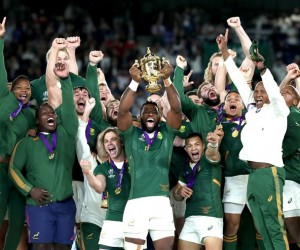Guts, determination, discipline, teamwork and sticking to the game plan delivered the glory of the 2019 Rugby World Cup to the Springboks! ‘Stronger together’ was the new meme that trended across South Africa as we celebrated the strength in our diversity.
Contrast this significant achievement with the depressing data presented by the Finance Minister, Tito Mboweni, at the recent Medium Term Budget Policy Statement; the high debt to GDP ratio of 70%; the under recovery of over R50 billion in tax revenue; the high unemployment rate of over 29%; the Eskom debt albatross that is rapidly strangling the South African economy! And If the numbers are scary, what is scarier, are the narratives behind the numbers such as the incompetence in various state organs, endemic corruption, lack of accountability and poor governance.
Like the South African economy, the Springboks found themselves in a similar precarious position a few years ago when they were in the rugby doldrums; even losing to Japan in 2015. However, with a new coach that understood the intricacies of the game at the helm, renewed vision, a well-crafted game plan and playing for a higher purpose, the ‘Boks’ are currently ruling the rugby world!
Much of our country’s social ills – crime, poor governance, high unemployment and economic failure, are attributable to indecisive leadership, no implementable ‘game plan’ and the lack of team ethic. Our fractured parliament and obstructionist labour unions do not enable sound policy implementation. There’s been much talk, and criticism, about the National Development Plan. Although it might not resonate with the aspirations of all political entities, much of the NDP when implemented will yield significant benefit. What is needed is commitment to action. The challenges facing South Africa such as the high unemployment, the inability to create jobs and the subsequent enduring poverty remain serious threats to our sustainability as a nation..
So how do we transform from being mediocre to becoming world class? ‘Disrupt, or be disrupted!’ is the mantra by proponents of the ‘4th Industrial Revolution’. We can see this in the digital technology tsunami sweeping across the world. Ask Standard Bank how technology has disrupted conventional ways of doing banking! The answer is simple; cost-effective, innovative and efficiencies rule!
Known for his straight talking, South Africans expected Minister Mboweni to make bold changes to the economy. South Africans are well aware of the fiscal and social challenges, so what we wanted to hear was whether the government has the guts, determination and discipline needed to effect real change! The Finance Minister should have shown his mettle by making more drastic cuts to the bloated state wage bill by reducing government perks, holding officials to account for poor performance, selling off or unbundling loss-making parastatals and by chiding the NPA to speed up the prosecutorial processes so that malfeasance be prosecuted. Then he should introduce a stronger service ethic into all state institutions. The Japanese nailed their success down to kaizen or making small incremental improvements on an ongoing basis.
No one can doubt that our current crop of black Springboks deserve to wear the ‘green and gold’. Hence, the only way to make South Africa great again is to break the ‘entitlement syndrome’ and to nurture a productive and excellence oriented work ethic. William C. Taylor in ‘Simply Brilliant – How Great Organisations do ordinary things in extraordinary ways!’ shows how businesses have become successful through integrating excellence in their common business practices.
In Springbok captain, SiyaKolisi's journey to greatness, he mentions moving from Zwidetownship to attend Grey High School. Good schooling and the social currency that comes with it are potential game changers in a young person’s life. With South Africa’s high GDP spend on education, it is an indictment that our public education is floundering. The recent International Monetary Fund (IMF) working paper, "Struggling to Make the Grade: A Review of the Causes and Consequences of the Weak Outcomes of SA’s Education System" paints a poor picture of the basic education system.
Education is more than equipping someone with the 3Rs. It’s also about preparing a learner for citizenship and for professional life. With large numbers of graduates in competition for fewer job opportunities, the key question they should ask themselves is, ‘What compelling value do they offer a prospective employer?’ In one of his columns, New York Times columnist, Thomas L. Friedman, wrote, ‘Today, average is officially over!’ Because in a world of increasing competition being average doesn’t cut it anymore. Thriving in business, or professional life requires excellent performance. After losing to the All Blacks in the opening round of the 2019 Rugby World Cup, the Springboks had no choice but to up their game.
South Africa’s economic and social challenges deserve nothing short of the very best solutions and the most qualified officials to implement them. Meritocracy and the recruitment of the sharpest minds into its civil service should be the game plan. An ‘excellence ethic’ will bring out the best in ourselves and drive us to improve our capabilities. As former American football coach, Vince Lombardi, explains, ‘The quality of a person's life is in direct proportion to their commitment to excellence, regardless of their chosen field of endeavour’. For our sake and our children’s sake, let us be stronger together!
Rudi Kimmie (PhD) is Academic Dean at TSIBA Business School. He writes in his personal capacity.
Image Credit: nbcnews






